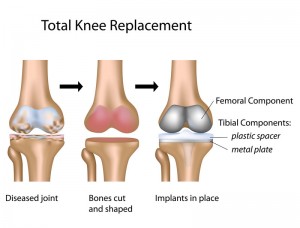by SportsDoc Raj
Total knee replacement is a surgical approach used to replace a diseased or injured knee with an artificial joint. Total knee replacement is usually considered after nonsurgical approaches have been tried and failed. This has been a revolutionary pain management procedure and it is in fact one of the most successful medical procedures in existence. The procedure is undertaken to help the patient restore the function of the knee.
5 Facts You May Not Know About Total Knee Replacement
- Over 400,000 total knee replacement procedures are performed yearly in the U.S: This is a very common procedure and almost
 half a million total knee replacement procedures are conducted in the U.S alone, every year. The mortality rate from the procedure is less than one tenth of one percent. Most patients who undergo the procedure experience increased range of function and a significant reduction in pain.
half a million total knee replacement procedures are conducted in the U.S alone, every year. The mortality rate from the procedure is less than one tenth of one percent. Most patients who undergo the procedure experience increased range of function and a significant reduction in pain. - Only the bone surface is replaced: A more suitable term for knee replacement should be knee resurfacing since the surface of the bone is what is replaced.
- The cartilage and bone are replaced with metal and plastic components: Metal and plastic are the materials of choice when it comes to this surgical procedure. The cartilage surface is removed as well as a small part of the underlying bone. The cartilage and bone are then replaced with metal elements which are cemented into the bone. The knee is also cut and resurfaced. However, this is not always necessary and will depend on the extent of the damage. Finally, the plastic comes in as a spacer which is introduced in between the metal femoral and tibial components.
- Most patients who undergo knee replacement are aged between 50 and 80: Although total knee replacement can be performed on patients of any age, it is most common amongst the elderly age group. This is because arthritis is one of the major factors that contribute to knee deterioration. Since knee replacement procedures are only meant to last 10 to 20 years, it is best to have the patients hold off on the procedure as long as possible.
- Total knee replacement does not necessarily bring about total restorative function: You need to be realistic with your expectation of the surgery. While the main aim of the surgery is to improve knee function and relieve pain; you still may have restrictions in terms of function. This could be temporary and sometimes the restrictions could last your entire life.
Possible Complications Arising from Total Knee Replacement
 Just like any other surgical procedure, there are complications that could follow the procedure. Joint infection is one of the serious complications and occurs in about one percent. Blood clots are the most common complications and there are post-operation care practices that you could take to prevent the formation of blood clots.
Just like any other surgical procedure, there are complications that could follow the procedure. Joint infection is one of the serious complications and occurs in about one percent. Blood clots are the most common complications and there are post-operation care practices that you could take to prevent the formation of blood clots.
Thankfully most blood clots are inconsequential but there is a remote chance the clot could travel to the lung and become a pulmonary embolism. Implant problems also could arise, either due to loosening of the components or wear. Complications arising from total knee replacement surgery overall affect less than two percent of patients.
